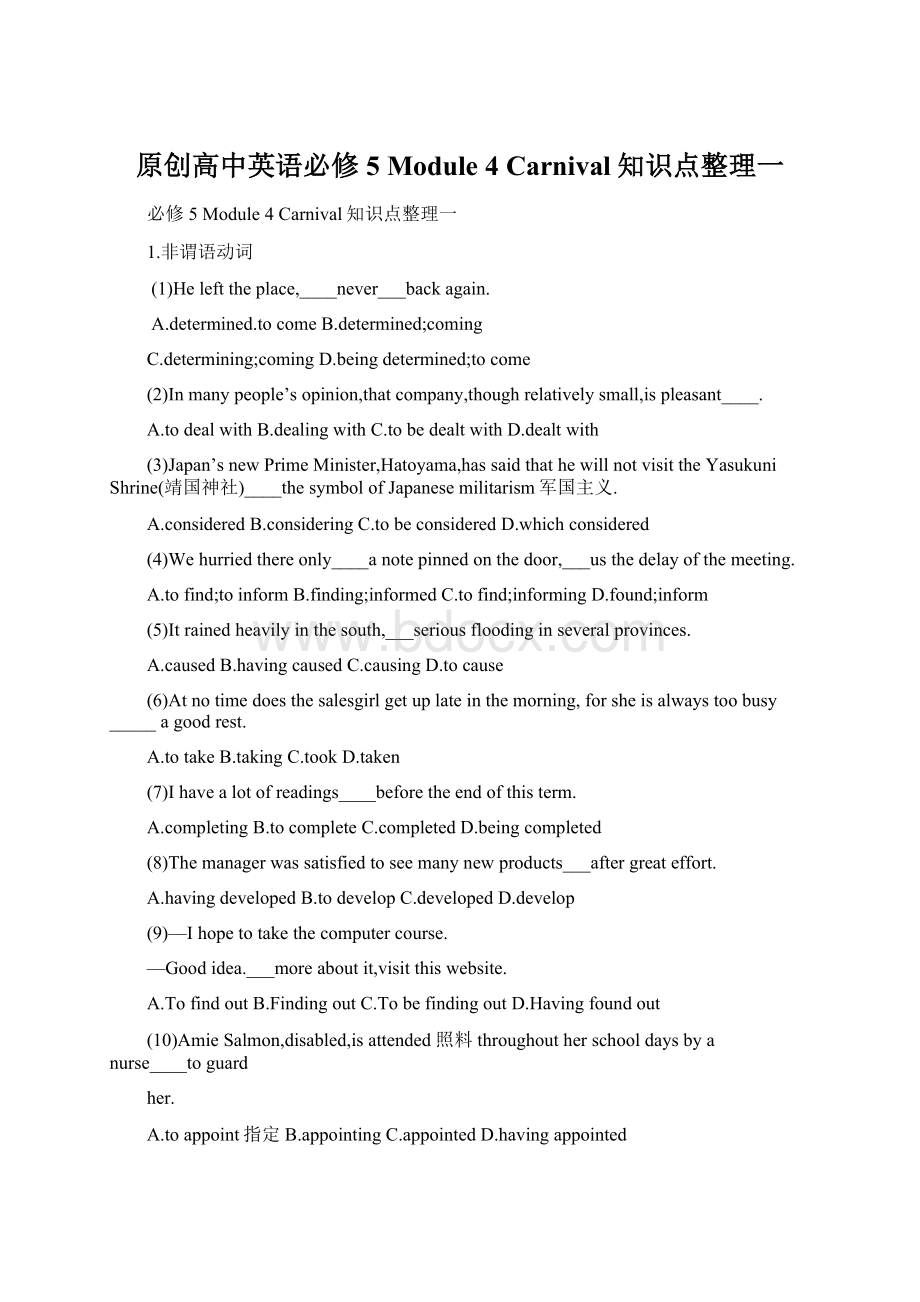原创高中英语必修5 Module 4 Carnival知识点整理一.docx
《原创高中英语必修5 Module 4 Carnival知识点整理一.docx》由会员分享,可在线阅读,更多相关《原创高中英语必修5 Module 4 Carnival知识点整理一.docx(14页珍藏版)》请在冰豆网上搜索。

原创高中英语必修5Module4Carnival知识点整理一
必修5Module4Carnival知识点整理一
1.非谓语动词
(1)Helefttheplace,____never___backagain.
A.determined.tocomeB.determined;coming
C.determining;comingD.beingdetermined;tocome
(2)Inmanypeople’sopinion,thatcompany,thoughrelativelysmall,ispleasant____.
A.todealwithB.dealingwithC.tobedealtwithD.dealtwith
(3)Japan’snewPrimeMinister,Hatoyama,hassaidthathewillnotvisittheYasukuniShrine(靖国神社)____thesymbolofJapanesemilitarism军国主义.
A.consideredB.consideringC.tobeconsideredD.whichconsidered
(4)Wehurriedthereonly____anotepinnedonthedoor,___usthedelayofthemeeting.
A.tofind;toinformB.finding;informedC.tofind;informingD.found;inform
(5)Itrainedheavilyinthesouth,___seriousfloodinginseveralprovinces.
A.causedB.havingcausedC.causingD.tocause
(6)Atnotimedoesthesalesgirlgetuplateinthemorning,forsheisalwaystoobusy_____agoodrest.
A.totakeB.takingC.tookD.taken
(7)Ihavealotofreadings____beforetheendofthisterm.
A.completingB.tocompleteC.completedD.beingcompleted
(8)Themanagerwassatisfiedtoseemanynewproducts___aftergreateffort.
A.havingdevelopedB.todevelopC.developedD.develop
(9)—Ihopetotakethecomputercourse.
—Goodidea.___moreaboutit,visitthiswebsite.
A.TofindoutB.FindingoutC.TobefindingoutD.Havingfoundout
(10)AmieSalmon,disabled,isattended照料throughoutherschooldaysbyanurse____toguard
her.
A.toappoint指定B.appointingC.appointedD.havingappointed
(11)Whilewaitingfortheopportunitytoget_____,Henrydidhisbesttoperformhisduty.
A.promoteB.promotedC.promotingD.topromote
(12)Groupactivitieswillbeorganizedafterclass___childrendevelopteamspirit.
A.helpingB.havinghelpedC.helpedD.tohelp
(13)Theymightjusthaveaplace___onthewritingcourse—whydon’tyougiveitatry?
A.leaveB.leftC.leavingD.toleave
(14)____whichuniversitytoattend,thegirlaskedherteacherforadvice.
A.NotknowingB.KnowingnotC.NotknownD.Knownnot
(15)Letthoseinneed_____thatwewillgoallouttohelpthem.
A.tounderstandB.understandC.understandingD.understood.
(16)_____(admit)tothekeyuniversity,allthestudentsinSenior3aremakinggreateffortstostudy.
(1)A
(2)A句意:
在许多人看来,那家公司尽管相当的小,但是和它打交道很愉快。
(3)A后置定语(4)C我们匆匆赶到那里,结果发现门上贴着一张通知,说会议延期了。
(5)C(6)A考查too...to...结构。
注意:
atnotime(在什何时候都不)放在句首时,句子要用倒装语序。
(7)B(8)C很多新产品被研发出来,过去分词作宾补(9)A(10)C身残的艾米·萨蒙在她的整个学业生涯中,由一名指定的护士照料着。
后置定语(11)B在等待机会被提拔期间,亨利尽力履行好自己的职责。
(12)D(13)B后置定语(14)A(15)B(16)Tobeadmitted动词不定式作目的状语
2.从句练习
(1)Inourclassthereare46students,____halfwearglasses.
A.inwhomB.inthemC.ofwhomD.ofthem
(2)Inmyhometownthereareseveralplacesofhistoricinterest___manypeoplecanpayavisittoenjoytheancientculture.
A.fromwhichB.towhichC.bywhichD.inwhich
(3)Lastweek,Iboughtaninterestingstorybook,____isverybeautiful.
A.whichcoverB.thecoverofwhichC.itscoverD.thecoverofwhose
(4)Tomshowedmehisnewcellphone,___wassmallbutitcouldchangecolorsindifferentweather.
A.thescreenofwhomB.whomthescreenofC.whichthescreenofD.thescreenofwhich
(5)BillGates,___moneyisn’taproblem,stilllivesaverysimplelifenow.
A.whichB.forwhoseC.forwhomD.withwhose
(6)PeopleWhoMovedChina,hostedbyCCTV,honoursthepeople,thevaluablecontributions____shouldberememberedbyeveryChinese.
A.whoseB.ofwhomC.thatD.ofwhich
(7)Shebroughtwithherthreefriends,noneof___Ihadevermetbefore.
A.themB.whomC.whoD.these
(8)Lastweek,onlytwopeoplecametolookatthehouse,____wantedtobuyit.
A.noneofthemB.bothofthemC.noneofwhomD.neitherofwhom
(9)Withoutfacts,wecan’tformacorrectopinion,forweneedtohaveactualknowledge_____ourthinking.
A.whichtobebasedonB.onwhichtobaseC.whichtobaseonD.whichtobase
(10)Thoughhetriedmanywaystosolvetheproblem,_____worked;hedecidedtoturntohistutorforhelp.
A.noneofwhichB.allofthemC.noneofthemD.allofwhich.
(11)TherearemanynewcentralleadersinChinanow,____manyonceworkedinthewesternprovinces.
A.inwhichB.ofwhomC.inwhomD.forwhom
(12)Tomakestringpictures,firstdrawtheoutlineofapictureonacard,thenspreadtheglue____youwanttoattachthestring.
A.towhichB.onwhichC.whereD.that
(13)“I’dliketoexpressmythankstothose____helpmyhusbandwouldhavebeenkilledintheaccident,”saidthewomanonTV.
A.whoB.withtheirC.withwhoseD.withoutwhose
(14)Everyyearmoretouristscrowdtheretovisitthescenery,someof____arefromothercountries.
A.themB.whichC.whoD.whom
(15)Thereare30balls,___60percentaregreen,andtherestareblue.Doyouknowhowmanyways___youpickedapairofblueballs?
A.ofwhich;inwhichB.fromwhich;whichC.where;thatD.ofwhich;fromwhich
(16)Thebookhashelpedmegreatlyinmydailycommunication,especiallyatwork____agoodimpressionisamust.(用适当的关系代词填空)
(17)Heisalwaysveryrude,___iswhypeopletendtoavoidhim.
A.thatB.itC.thisD.which
(1)C
(2)B(3)B(4)D从四个选项的设置不难看出是考察介词加关系代词引导的非限制性定语从句。
再从先行词cellphone可看出是指物,可排除A和B。
C项中关系代词应放在介词之后,如改为ofwhichthescreen或者whosescreen也是可以的。
(5)C(6)BCCTV举办的感动中国人物评选活动是给那些做出巨大贡献的人授予荣誉,他们应当被每一个中国人铭记.先行词是thepeople(7)B(8)D(9)B没有事实,我们不能得出正确的结论,因为我们需要把我们的思考观点建立到一定的知识层面上.basesthonsth,把……建立在……基础上,还有一个知识点就是:
“介词+which+不定式”这种定语从句多见于正式文体中,相当于一个带有主语和谓语的定语从句。
Shehasonly1.87yuanwithwhichtobuy(=shecanbuy)Jim,herhusband,apresent.她只有1.87元,给她丈夫吉姆买礼物。
(10)C(11)B 句意:
如今在中国出现了许多新的中央领导人,他们中许多人都曾在西部省份工作。
先行词是人,应用关系词whom引导定语从句;表所属,应用of。
(12)Cwhere引导地点状语从句.指“在你想要粘贴绳子的地方涂胶水”(13)D(14)D(15)A(16)where这本书对我的日常交流很有帮助,尤其是在那些必须给人留下良好印象的工作中。
(17)D
3.时态练习
(1)WhenIfirstmetBryanIdidn’tlikehim,butI____mymind.
A.havechangedB.changeC.hadchangedD.wouldchange
(2)Therearesomehealthproblemsthat,when_____intime,canbecomebiggeroneslateron.
A.nottreatedB.notbeingtreatedC.nottobetreatedD.nothavingbeentreated
(3)Thismachine_____.Ithasn’tworkedforyears.
A.didn’tworkB.wasn’tworkingC.doesn’tworkD.isn’tworking
(4)—HowcanIapplyforanonlinecourse?
—Justfillinthisformandwe_____whatwecandoforyou.
A.seeB.areseeingC.haveseenD.willsee
(5)—MrZhao,couldyouhelpmewithmymaths?
—Sure,cometomyofficeat7pm.I_____severalotherkidsmathsthenandyoucanjoinus.
A.havingbeenteachingB.havetaughtC.willteachD.willbeteaching
(6)—DidyoucatchwhatIsaid?
—Sorry.I____atextmessagejustnow.
A.hadansweredB.haveansweredC.wouldanswerD.wasanswering
(7)—Kevin,youlookworried.Anythingwrong?
—Well,I____atestandI’mwaitingfortheresult.
A.willtakeB.tookC.hadtakenD.take
(8)Thethreeofus____aroundEuropeforaboutamonthlastsummer.
A.travelledB.havetravelledC.hadtravelledD.travel
(9)WhenAlicecameto,shedidnotknowhowlongshe____there.
A.hadbeenlyingB.hasbeenlyingC.waslyingD.haslain
(10)I____tovisityoulaterthatday,butIhadtophoneandcancel.
A.comeB.cameC.amcomingD.wascoming
(11)We___veryearlysowepackedthenightbefore.
A.leaveB.hadleftC.wereleavingD.haveleft
(12)IfeltverytiredwhenIgothome,andI____straighttobed.
A.goB.wentC.hadgoneD.havegone
(13)I’mcallingabouttheapartmentyou_____theotherday.Couldyoutellmemoreaboutit?
A.advertisedB.hadadvertisedC.areadvertisingD.willadvertise
(14)Theybecamefriendsagainthatday.Untilthen,they_____toeachotherfornearlytwoyears.
A.didn’tspeakB.hadn’tspokenC.haven’tspokenD.haven’tbeenspeaking
(15)—Isthereanythingwrong,Bob?
Youlooksad.
—Oh,nothingmuch.Infact,I______ofmyfriends.
A.havejustthoughtB.wasjustthinkingC.wouldjustthinkD.willjustbethinking
(16)—Canyougivemeahint(提示)whereIshouldtakeupthestorytheGiftoftheMagi?
—Sorry,mymind_____.
A.waswanderingB.hadwanderedC.iswanderingD.haswandered
(1)A
(2)A状语从句的省略。
本句还原为…whentheyarenottreatedintime…when引导的时间状语从句用一般现在时代替一般将来时(3)C(4)D此处为“祈使句+and+陈述句”,and之后的句子常用一般将来时。
(5)D(6)D(7)B(8)A(9)A(10)D(11)C(12)B
(13)A打电话咨询(14)B(15)B(16)A你能给我提示一下我该从哪儿开始讲“麦基的礼物”这个故事吗?
对不起,我不知道当时讲到哪儿了,因为我当时在想别的。
4.复习被动语态
使用被动语态应注意的问题
①不及物动词(短语)不能用于被动语态,这些常见的动词(短语)有happen,last,rise,occur,cost,appear,belongto,breakout,takeplace,cometrue,consistof等;感官动词或表示情况变化的动词也不能用于被动语态,这些常见的动词有taste,feel,look,smell,sound,seem,remain,continue,prove,become,grow,
get,come,go等。
Thecoatwascostme89yuan.(×)Thecoatcostme89yuan.(√)
Thewarwasbrokenoutin1937.(×)Thewarbrokeoutin1937.(√)
Thepatientwasremainedweak.(×)Thepatientremainedweak.(√)
②在主动语态里,动词see,make,hear,watch,notice等后面作宾语补足语的动词不定式不带to,但变为被动语态时,to必须补上。
Theymadehimgotherealone.→Hewasmadetogotherealone.
③带介词或副词的动词短语(如lookafter,puton,payattentionto)用作被动语态谓语时,它们原来所带的介词或副词应保留下来。
Sheoftenlooksaftertheold.→Theoldareoftenlookedafter(byher).
④如果主动语态的句子中有直接宾语和间接宾语,变为被动语态时,有两种方法:
把指人的间接宾语变为被动语态的句子的主语,或把指物的直接宾语变为被动语态的句子的主语,如果间接宾语需要保留,其前面常加介词to或for。
Fatherboughtmeanewcoat.→Iwasboughtanewcoat.
→Anewcoatwasboughtforme.
Hegavemeapen.→Iwasgivenapenbyhim.
→Apenwasgiventomebyhim.
⑤分词作宾语补足语的句子变为被动语态时,句中的宾语移到句首作主语。
Hesawsomeboysplayingfootball.→Someboyswereseenplayingfootball.
Iheardtheproblemsettledinthisway.→Theproblemwasheardsettledinthisway.
⑥有些动词在形式上有时是主动语态,但含有被动的意思,因此通常不使用被动语态。
适用于这种情况的动词主要有sell,wash,write,drive,eat,shut等。
这时主语一般是指物的词,而且常用well,badly,easily,slowly,quickly等副词来修饰这些动词。
Booksofthiskindsellwell.Thissweaterwasheswell.这种毛衣很耐洗。
Thispenwriteswell.这支笔很好写。
Theparcelcarrieseasily.包裹容易搬运。
Thiscardrivesfast.这辆汽车开得快.Thisshirtwillwearverylong.这件衬衫可以穿很久。
⑦get型被动句
构成被动语态的助动词除了be外,有时还可以用get。
Becaref